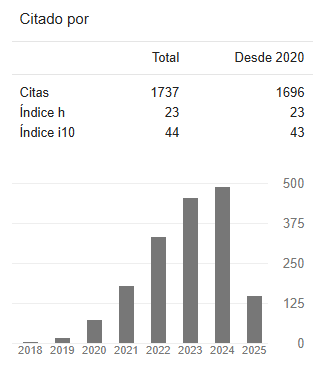Business management in the development of teaching capacities that promote sustainable entrepreneurship
DOI:
https://doi.org/10.29166/catedra.v5i2.3553Keywords:
creativity, entrepreneurship, business, management, sustainedAbstract
The objective of this research is to demonstrate to what extent the application of the business management program will increase sustainable entrepreneurship among teachers in Educational Units of Guayaquil-Ecuador 2021. The main problem revolves around the lack of knowledge about the relationship between business management and sustainable entrepreneurship since it has not been studied longitudinally. The study observed how sustained entrepreneurship affects the process and the durability of a student's confidence or identification with the teacher; therefore, the findings based on the surveyed population could guide on the most effective resources and educational strategies to develop and maintain motivation and sustainability in entrepreneurship. The most outstanding results revealed that in the pretest of the experimental group 21.1% is in the medium level and 78.9% in the high level; for the control group 29.8% is in the medium level and 70.2% in the high level; after the application of the program the level of this experimental group increased to 100%. It is concluded that the effectiveness of the program in the social aspect is an important ingredient in the current business education environment and contributes significantly to the general welfare of society.
Downloads
References
Mancilla, C., y Amorós, J. E (2015). Entrepreneurship in regions: differentiated impacts of the socio cultural and gender types. Academia Revista Latinoamericana de Administración.
López-Lemus, J. A., De la Garza Carranza, M. T., Ibarra, Q. A., & López-Lemus, J. G (2021). Strategic planning key factor in tangible–intangible results in microenterprises. Management Research: Journal of the Iberoamerican Academy of Management.
Kayl, I. I., Borytko, N. M., Vlasyuk, I. V., y Kozlovtseva, E. A (2017). Crisis management as a key direction of business education in market economy. In Russia and the European Union (pp. 461-467). Springer, Cham.
Chiavenato, I (2010). Administración sin fronteras. Publicaciones Icesi.
Miles, M (2019). An effectual approach to teaching social entrepreneurship: Service-learning initiatives. In 26th International Vincentian Business Ethics Conference (IVBEC) 2019.
Stewart, J., & Hocking, C (2019). Adaptive Sustainability for Business Management in an Age of Disruption and Transformation. In Responsible Business in Uncertain Times and for a Sustainable Future (pp. 1-17). Springer, Cham.
Briceño, J. C. P., Pereira, S. E. J., y Cabrera, O. A. G (2017). Emprendimiento social: una aproximación teórica-práctica. Dominio de las Ciencias, 3(2), 3-18.
Ratten, V., Jones, P., Braga, V., y Marques, C. S (2019). Sustainable entrepreneurship: The role of collaboration in the global economy. In Sustainable Entrepreneurship (pp. 1-7). Springer, Cham.
Chen, C (2021). Effects of the Application of WebQuest to Technology Education on Business Management Students' Critical Thinking Psychology and Operation Capability. Contemporary Educational Technology, 13(1).
Raza, S. A (2019). Master of Business Education Program Effectiveness Assessment. Bulletin of Education and Research, 41(3), 73-88.
Ruidías, H. D (2020). La gestión de calidad en la capacitación y su incidencia en la atención al cliente de las micro y pequeñas empresas del sector servicios rubro restaurantes de Piura cercado 2019.
Carrasco (2020). Cuestionario para medir conductas alimentarias de riesgo de malnutrición por exceso en adolescentes. Nutrición Hospitalaria, 37(1), 37-45.









